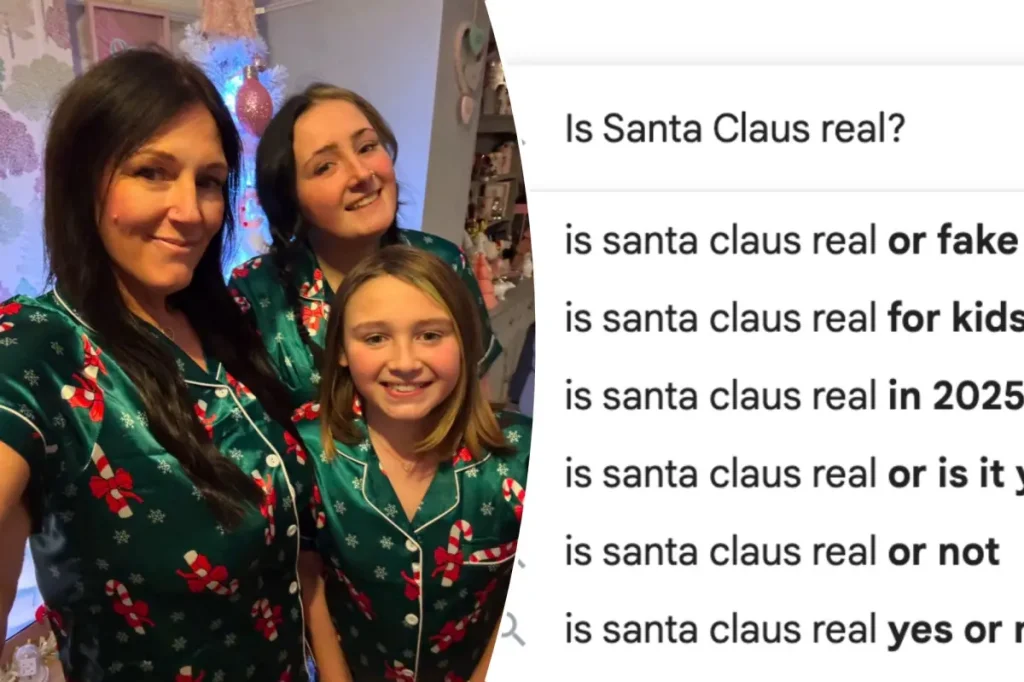How AI Became the Grinch Stealing Christmas
In the digital age, artificial intelligence has unexpectedly become the holiday truth-teller that parents never asked for. What was once a gentle childhood transition—discovering the truth about Santa Claus through whispered playground conversations or a natural process of growing up—has been replaced by blunt AI responses that can shatter holiday magic in an instant.
Kelly Bowron experienced this digital disruption firsthand when her 11-year-old son Leo, whose belief in Santa had remained wonderfully intact into his preteen years, innocently asked Google about Santa’s budget per child. Instead of playing along with the festive fantasy, Google’s AI delivered the cold truth: “There is no set amount Santa spends per child, as he is a fictional character.” Leo’s shocked scream and subsequent middle finger to the search engine reflected his profound disappointment, while his mother scrambled to perform damage control, insisting that “Google doesn’t always tell the truth.” Although a Google spokesperson later told The Post that the company “believes in Santa” and even features a Santa tracker, the AI overview—which pulls from trending web content—had already done its damage. For Bowron and many parents like her, these moments represent not just a holiday tradition disrupted but the premature end of childhood innocence.
The challenge extends far beyond one family’s experience. Jeanice Perez, a single mother from Las Vegas, was blindsided when her third-grade daughter Jordyn stormed through the door demanding to “talk” after Google had revealed the truth about Santa. For Perez, it felt like a personal betrayal after years of careful dedication to maintaining the illusion—perfecting her “Santa” handwriting, leaving nibbled cookies, and ensuring her daughter never found the hidden wrapping paper. The technological intrusion into this cherished tradition left her feeling robbed of a parental milestone. Similarly, Natalie, an NYC mother of two, was saddened when her 7-year-old daughter matter-of-factly announced her disbelief after Google told her “Santa was invented by Coca-Cola.” The sudden disillusionment spread through her daughter’s classroom like wildfire, with many children confronting the truth through AI rather than through the gentle guidance of parents or the natural course of growing up.
Research indicates this is becoming a widespread phenomenon, with 51% of children aged 8 and younger now having their own mobile devices, and approximately one-third of parents allowing their children to use AI chatbots for answering everyday questions—including inquiries about Santa’s existence. Jeremy Gutsche, an AI expert and father of two, suggests that in the ongoing battle between AI and concerned parents, technology will likely prevail. Despite the potential for tech companies to implement child-friendly guardrails, Gutsche believes such measures would be largely ineffective given the multitude of competing AI models and platforms. “There are dozens of competing models,” he explains, “and it would be nearly impossible for each platform to have one universal response to questions about Santa.” Rather than hoping for regulations that may never materialize, he advises parents to adapt to the new AI reality.
The consequences extend beyond individual families to reshape childhood experiences collectively. One elementary school teacher now faces students who skip the traditional questioning of adults altogether and go straight to AI for answers about holiday myths. When children do ask her directly about Santa, she uses the opportunity to teach the difference between “beliefs” and “knowledge”—though by that point, many kids have lost interest, distracted by other thoughts. Some parents are taking drastic measures, like unplugging Google Home devices until after the holidays to preserve the magic. Nevertheless, there’s a growing sense that today’s children are becoming “slightly more cynical” thanks to AI’s influence, as the technology fails to account for the nuanced role that fantasy and imagination play in childhood development.
The responses from various AI platforms demonstrate the inconsistency that parents face. When The Post asked different systems if Santa is real, the answers ranged from Google’s blunt “No, the mythical figure of Santa Claus is not real” to Siri’s coy “That’s something I’m not allowed to disclose.” ChatGPT, Gemini, and Grok each offered variations acknowledging Santa as a legend or tradition rather than a literal person, but none fully preserved the magic that parents might wish to maintain for younger children. This technological honesty creates a new parenting challenge: how to preserve wonder and imagination in a world where answers—sometimes unwanted ones—are just a voice command away. As families navigate this new landscape, they’re discovering that the greatest gift they might need this season is a strategy for balancing digital truth with childhood wonder, ensuring that even in an AI-dominated world, there’s still room for a little Christmas magic.















